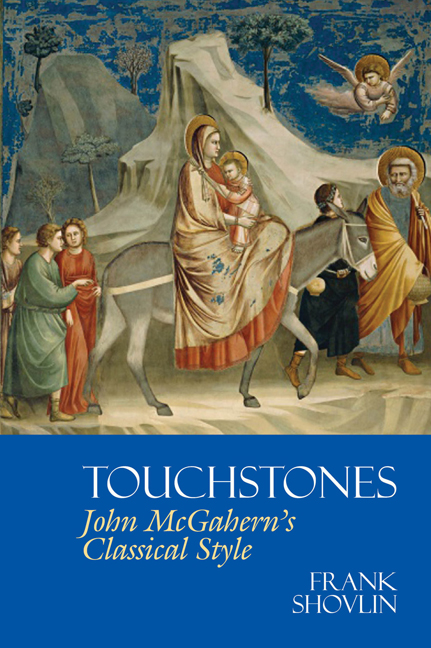Book contents
- Frontmatter
- Dedication
- Epigraph
- Contents
- Acknowledgements
- Touching Stones: Matthew Arnold and the Canon
- 1 We Other Clerks: James Joyce and the Classical Temper
- 2 A Walking Mirror: Stendhal, Horace, Nietzsche
- 3 One Lone Paperback: Tolstoy and Religious Sensibility
- 4 Magic: The Centrality of W. B. Yeats
- 5 Instinct: Douglas Stewart and Sex
- 6 The Fume of Muscatel: Yeats's Ghosts
- 7 Bohemian Rhapsody: Patrick Kavanagh and Generation X
- 8 Absurdity: Camus Comes to Clones
- 9 Aristocracy: Andrew Marvell, W. B. Yeats and the Curse of Cromwell
- 10 The Consolations of Nothingness: William Blake, W. B. Yeats and Prayer
- 11 Deliberate Happiness: W. B. Yeats and the Inner Life
- 12 Stranger in Paradise: Dante and Epic Style
- Conclusion: What Then?
- Bibliography
- Index
12 - Stranger in Paradise: Dante and Epic Style
from Touching Stones: Matthew Arnold and the Canon
- Frontmatter
- Dedication
- Epigraph
- Contents
- Acknowledgements
- Touching Stones: Matthew Arnold and the Canon
- 1 We Other Clerks: James Joyce and the Classical Temper
- 2 A Walking Mirror: Stendhal, Horace, Nietzsche
- 3 One Lone Paperback: Tolstoy and Religious Sensibility
- 4 Magic: The Centrality of W. B. Yeats
- 5 Instinct: Douglas Stewart and Sex
- 6 The Fume of Muscatel: Yeats's Ghosts
- 7 Bohemian Rhapsody: Patrick Kavanagh and Generation X
- 8 Absurdity: Camus Comes to Clones
- 9 Aristocracy: Andrew Marvell, W. B. Yeats and the Curse of Cromwell
- 10 The Consolations of Nothingness: William Blake, W. B. Yeats and Prayer
- 11 Deliberate Happiness: W. B. Yeats and the Inner Life
- 12 Stranger in Paradise: Dante and Epic Style
- Conclusion: What Then?
- Bibliography
- Index
Summary
I turned round to my left, with that trust
With which a child runs to his mother,
When he is afraid or in trouble,
To say to Virgil: 'Less than a drop of blood
Is left in me, that is not trembling:
I know the signs of the ancient flame.’
But Virgil had taken himself away from us,
Virgil, my sweetest father, to whom
I had given myself up for my own well-being;
Nor was all that our ancient mother lost
Enough to keep my cheeks, although washed with dew,
From turning dark with tears, and I wept.
Dante, The Divine ComedyIf Yeats felt that Keats was wrong to pursue ‘deliberate happiness’, he saw in Dante an artist whom he could unreservedly admire, one who chose ‘tragic’ over ‘happy’ art, and who, in writing The Divine Comedy, had produced the great epic of his people, something Yeats regretted he would never accomplish. ‘Keats but gave us his dream of luxury’, he writes, ‘but while reading Dante we never long escape the conflict, partly because the verses are at moments a mirror of history, and yet more because that history is so clear and simple that it has the quality of art’. We have seen in the previous chapter how Yeats drew the title of his 1915 poem ‘Ego Dominus Tuus’ from Dante's La Vita Nuova. From adolescence, Dante was a key influence on Yeats's thinking and writing. Originally, his admiration for the great Florentine came via the Pre-Raphaelite circle of which his father, John Butler Yeats, was an enthusiastic member. ‘I am no Dante scholar’, WBY readily admits in Per Amica Silentia Lunae, the intriguing 1917 essay to which ‘Ego Dominus Tuus’ forms a preface. That noted, he recalls in his Autobiographies a youthful moment of artistic reverence in the Walker Gallery, Liverpool: ‘Yet I was in all things Pre-Raphaelite. When I was fifteen or sixteen my father had told me about Rossetti and Blake and given me their poetry to read; and once at Liverpool on my way to Sligo I had seen Dante's Dream in the gallery there’.
- Type
- Chapter
- Information
- Touchstones: John McGahern’s Classical Style , pp. 162 - 179Publisher: Liverpool University PressPrint publication year: 2016



